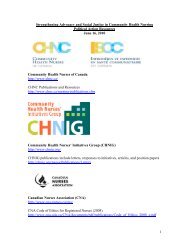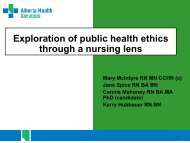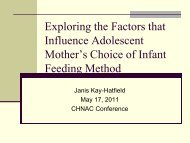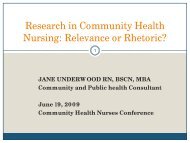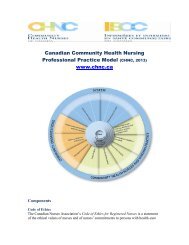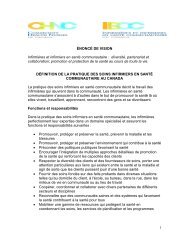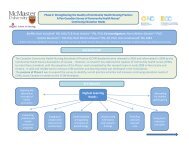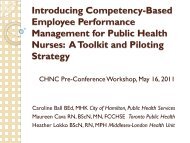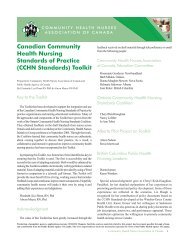Competencies for Home Health Nursing: A Literature Review
Competencies for Home Health Nursing: A Literature Review
Competencies for Home Health Nursing: A Literature Review
You also want an ePaper? Increase the reach of your titles
YUMPU automatically turns print PDFs into web optimized ePapers that Google loves.
their cultural background and there<strong>for</strong>e will need to learn how to interacteffectively with people in providing quality care, despite different socialbackgrounds, cultures, religions and lifestyle preferences” (p. 36).A study involving relatives of terminally ill Turks and Moroccans in the Netherlands (deGraaff and Francke, 2003) illustrated the benefits of nurses’ cultural competency. Theauthors speculated that relatives’ higher level of satisfaction with the communication ofhome health nurses was related to HHNs’ knowledge of, and adherence to “unwrittenrules… [embedded in] culturally defined patterns of behaviours” (p. 803).Evidence-Based PracticeHHNs’ competency in evidence-based practice, including keeping their clinicalknowledge current, was illustrated by Purkis and Bjornsdottir (2006) who observed that“the nurse is trans<strong>for</strong>ming the evidence that she brings to the home” (p. 249) … andkeeping “up with new ideas and in<strong>for</strong>mation, while being confident in her judgment ofthe validity and utility of all of this <strong>for</strong> her local situation” (p. 255). Witter (2005) declaredthat “Programs must incorporate practice guidelines, clinical pathways and other tools…[and that the nurse must] collect and analyze variances from expected interventions andoutcomes (p. 39). Other support <strong>for</strong> including evidence-based practice as acompetency was provided by Inglis et al. (2004) who called on nurses to applyguidelines to ensure optimal management of [patients’] chronic conditions whereappropriate. The experience of using clinical guidelines and evidence-based protocols<strong>for</strong> patients with heart failure was shared by Ervin, Scrivener and Simons (2004).Frable, Wallace and Ellison (2004) discussed utilization of guidelines <strong>for</strong> patients withdiabetes.Organizational <strong>Competencies</strong>Time management and organizational skillsTime management and organizational skills were identified as competencies <strong>for</strong> HHNsby multiple authors (ANA, 2008; Benefield, 2000; Sherry, 1996; Zurmehly, 2007). Theseskills influence the nurse’s productivity. Benefield (1996; 1998) explained thatproductivity encompasses the effectiveness and efficiency of the service. Efficiency isviewed as the time it takes <strong>for</strong> the nurse to complete the visit activities, witheffectiveness referring to the outcomes associated with the services provided.Humphrey (2002a) declared that the system <strong>for</strong> measuring productivity as a specifiednumber of visits per day is inadequate and called <strong>for</strong> productivity expectations to takeinto consideration the competencies of the clinicians to “provide the care and reach thenecessary clinical outcomes” (p. 743).Care CoordinationCare coordination was identified by Inglis et al. (2004) as “Optimizing patient access toeffective multidisciplinary management (involving their primary care physician, specialistphysician, community pharmacist, community nurse, and other allied healthprofessionals where appropriate) with clear treatment and outcome goals” (p. 121).Evidence that HHNs require competency in care coordination (also called case or care<strong>Competencies</strong> <strong>for</strong> <strong>Home</strong> <strong>Health</strong> <strong>Nursing</strong>: <strong>Literature</strong> <strong>Review</strong> 10




